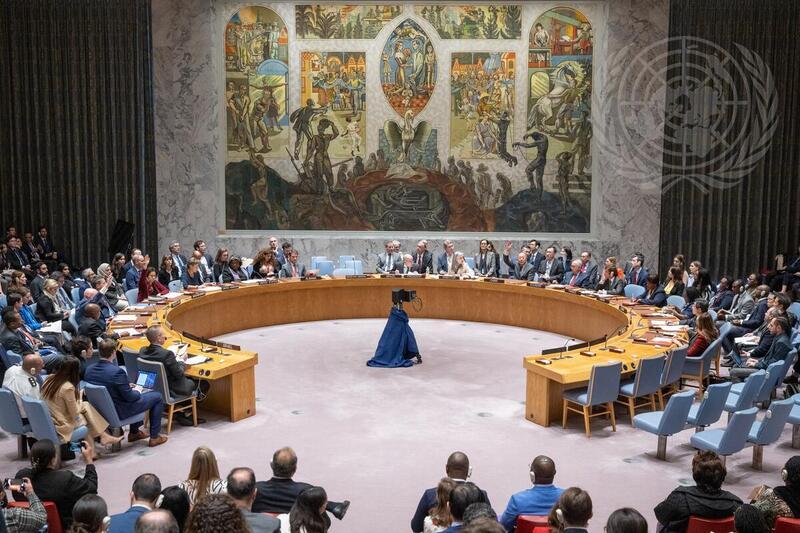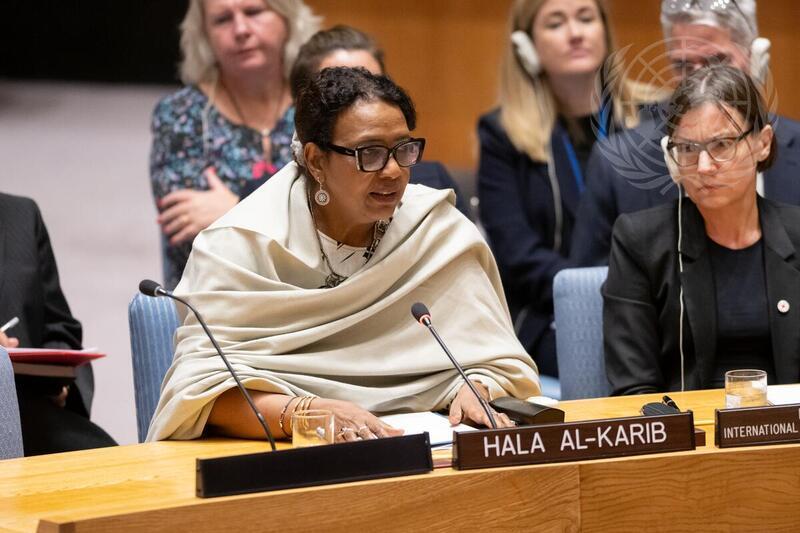Hypocrisy at the Security Council Is Stalling Progress on WPS
October 31, 2023
Every year, the annual Open Debate on Women, Peace and Security takes place within a context of persistent violence, instability, and armed conflict. In 2021, the Taliban’s takeover of Afghanistan loomed over the discussions, amidst the failure of the international community to heed the words of warning spoken by the 2020 Afghan civil society briefer, Zarqa Yaftali. Last year, the Russian invasion of Ukraine underscored the Security Council’s inability to act with the persistent threat of veto.
The backdrop to this year’s annual open debate on Security Council resolution 1325 (2000) on women, peace and security (WPS), adopted exactly 23 years ago today, has been horrific, with ongoing violence in Palestine and Israel. During the debate, many briefers and member state representatives pointed to the impacts of this violence on women and girls. The framing ranged from women and girls as “enduring years of Hamas cruelty”, to women and children bearing the brunt of “devastating bombardment, with 1,100 new female heads of household and 690,000 women and children forced to flee their homes” to “victims of Hamas’ brutal atrocities and victims of relentless bombing of Gaza” (emphasis added).
Despite the range in framing around the ongoing violence, the blanket consensus of the briefers and representatives alike was that more needs to be done in implementing the WPS agenda. Speaker after speaker repeated calls for parity in representation of women in peacebuilding and politics; countering the pushback on women’s human rights; and protecting women and girls who are impacted by conflict. These calls have remained consistently the same for the last 23 years, the life of UNSCR 1325. The representative of Canada summed this up succinctly at the beginning of her statement:
“When we started preparing our national statement, we looked at the one we made last year, and the year before, and the year before. And we were struck by how almost all of the text could be equally relevant today. I fear how far back we would go in years and continue to find usable material.”
The renewed violence in Palestine and Israel and the UNSC’s place within it helps to reflect a longer-standing trend. We continue to see the same discussions, the same words of praise and calls for more action on women’s participation (in particular) and the WPS agenda amid an environment rife with self-interest and hypocrisy. Many permanent and elected members of the Council wave their support for women, human rights, and rule of law, for example, and emphasize the importance of implementing the WPS agenda, but are simultaneously contributing to violence and insecurity around the globe. The barriers to implementing the WPS agenda are well-documented and clear, reflected in countless civil society reports and reports of the UN Secretary-General. But too few of these calls are heeded, particularly the ones on conflict prevention, demilitarization, and disarmament which would make a world of difference.
UN71008345__EDD7878_.jpg

This trend was illustrated clearly as the afternoon session of the open debate on UNSCR 1325 was delayed to make space for voting on two draft resolutions relating to the situation in Palestine submitted respectively by the United States and the Russian Federation. Both of the draft resolutions sought to implement a ‘humanitarian pause’ (language used by the US resolution) or ‘ceasefire’ (language used by the Russian Federation resolution) in Gaza. Neither were successfully adopted. The United States, United Kingdom and France expressed their disapproval of Russia’s resolution because it did not include an affirmation of Israel’s right to defend itself. These governments have sent billions of dollars worth of military aid to Israel, and many also buy weapons and surveillance systems from the Israeli government. The U.S. is currently proposing an extra $14 billion in funding for Israel as of October 31st, 2023. On the other hand, Russia – which, along with fifth permanent member China, is an antagonist of WPS and of human rights agendas in the UNSC – put forward language calling for a ceasefire in Gaza while continuing its own brutal bombardment and illegal occupation of Ukraine. During the same day, many members of the Security Council made multiple statements - one on WPS, full of words of support for its importance, laudation for themselves in their achievements, and calls to do more to address the resolutions, and another on these failed draft resolutions on which countless lives of innocent civilians lay in the balance.
To make it plain: UNSCR 1325 and the WPS Agenda have been forced to exist because of the resolute failure of powerful states to stop war and instability. Their decisions actively foment conflict and instability in order to further geopolitical interests, sell more lethal arms and other weapons, and advance ideological motives. This context is the underlying thread with which to understand the very reasons why the WPS framework has been unable to make the transformative difference that it should.
This is further demonstrated in the discourse around disarmament in both the open debate and the meeting on the Palestine resolutions. The representative of Malta made the most substantial comments comparatively on disarmament, noting that it was at the heart of the WPS agenda, but that global military spending is at its highest level. She emphasized the need to stop arms proliferation, as doing so will weaken the connection between militarisation and gender-based violence (GBV). Yet these calls were predictably not echoed by the permanent members of the Council, who are among the world’s top military spenders and arms traders.
In an almost identical way, during the open debate many States mentioned the importance of hearing directly from civil society organizations, amplifying their recommendations, and protecting women’s human rights defenders (WHRDs). The representative of the United States stated that the United States is committed to amplifying women’s voices and following up on their recommendations. In a similar vein, the representative of the United Kingdom expressed a commitment to amplifying women’s voices and recommendations, while also noting the need to protect women’s rights defenders, as they are subject to particularly vicious reprisals. Like the disarmament discourse, however, the reality is different, as calls from women’s organizations to demand a ceasefire in Palestine and Israel are being ignored, and human rights defenders are currently facing pushback across Europe and the U.S. Back in 2018, Randa Siniora briefed the UNSC and called upon Israel to end its military occupation and settlement expansion; commit to a political solution; and immediately cease violations of its commitments under international law. She also called for ending the culture of impunity and ensuring accountability for abuses and violations against women and women human rights defenders that have been committed by Israeli forces and any other actors. These recommendations were not heeded at the time, but remain more urgent and relevant than ever.
UN71008251__ME13956_.jpg

Next year, the annual open debate will likely take place amidst a new dimension of a crisis that overshadows most of the discussion. While Palestine and Israel loomed over the debate this year, the civil society briefer was Hala Al Karib, the Regional Director of the Strategic Initiative for Women in the Horn of Africa (SIHA), who briefed the council on the catastrophic situation in Sudan. Over 1,100 people have now been killed, with 12,000 people injured, but most statements did not substantively engage on the crisis. She outlined the urgency of implementing the WPS agenda, and used Sudan as a stark example of the consequences of failing to do so, citing sexual violence, rape, gender-based violence, repression of protestors, kidnapping and violence against members of human rights and women’s organizations, suicide, and lack of livelihoods for women.
The Council, however, must avoid whiplash: jumping from crisis to crisis and engaging at a superficial level with each one, while individual members are contributing to worsening the situation. This mode of action ignores the interconnectedness of each crisis, and omits a deeper, more meaningful engagement with root causes and structural phenomena. The heinous impacts of armed conflict are caused by similar actors, and felt by populations in similar ways. The WPS agenda, by fostering a culture of peace through women’s leadership and participation, reducing military expenditures and arms proliferation, and promoting non-violence, has the ability to address this at its core. Ms Al Karib attested to the need to think across contexts at the end of her statement, encouraging a show of solidarity with the women of Palestine, Afghanistan, Myanmar, Somalia, South Sudan, Syria, Ukraine, Yemen and other conflict-affected areas. With the leadership of many UNSC members continuing to shirk their duty in establishing a ceasefire and diplomatically working for international peace and security, the calls and leadership of civil society movements are more essential than ever.
